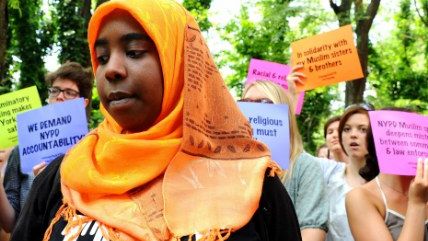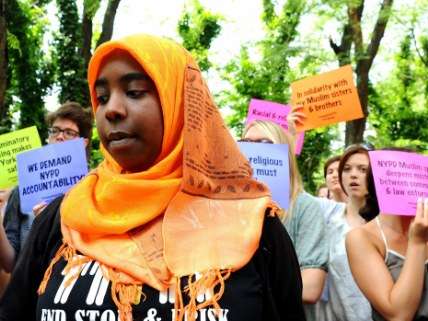Federal Judge Calls for More Citizen Oversight over NYPD's Surveillance Programs
Lawsuit settlement over city's unwarranted snooping of Muslims temporarily rejected.


A class action settlement pushed forward by both sides in response to the highly publicized New York Police widespread surveillance of Muslim residents has a federal judge demanding more before approving it.
Specifically federal Judge Charles Haight of the U.S. District Court for the Southern District of New York wants to make sure the participation of a non-police citizen in a proposed police-dominated committee that would evaluate the surveillance system would actually mean something.
In the wake of the Sept. 11 attacks, the New York Police Department began a practice of massive surveillance of Muslim residents of the city (and neighboring New Jersey). While the city very obviously had a need to track down potential terror plots, the NYPD's actual practice resulted in widespread snooping involving the use of informants apparently untied to any actual threats. The city's surveillance program drew lawsuits and failed to uncover any terrorist plots. The oversight committee would be part of the settlement for the suits.
The lawsuits prompted a look at previous guidelines to restrain unwarranted surveillance by the NYPD that were put in place in the '80s. So none of this is a new problem—just new targets. The NYPD has a lengthy history of snooping on various groups (of historical interest, Haight notes in this ruling that the roots of the NYPD's intelligence program are tied to snooping on Italian immigrants at the turn of the 20th century). This previous settlement put in place a system detailing among other things the circumstances by which police can engage in surveillance (suspicion of a crime), processes for approval for surveillance and expiration expectations when snooping fails to unearth relevant information.
The problem, Haight noted, is that a recent audit found that the NYPD wasn't following the rules that are in place right now, even after those rules were loosened a bit after the September 11 attacks. The audit found that while police were following guidelines on seeking the appropriate permissions to engage in surveillance and the use of informants, in about half the cases the use of surveillance tools and informants continued after the initial authorization expired.
So the fact that the NYPD aren't following guidelines right now prompted Haight to want to make sure this citizen in this proposed oversight board isn't just for show. The proposal is for this citizen to be a lawyer with no connections (present or past) to the NYPD appointed by the mayor. Problem: The mayor would also have the authority to eliminate the position after five years. This citizen would also have only limited abilities to blow the whistle on any problems he or she comes across, turning to the police commissioner or reporting to the court if he or she thinks the police are "systematically and repeatedly" violating surveillance guidelines.
That's not enough for Haight. He is suggesting that the citizen representative be allowed to communicate to the court with any concerns that come out of the committee's work, not just evidence of widespread violations. And Haight suggests the citizen representative submit a quarterly report to the court. And rather just letting the mayor eliminate the position by fiat in five years, Haight suggests the mayor have to come to the court to make the case it was no longer needed.
So for now Haight is rejecting the settlement, without prejudice, giving the parties involved the chance to make changes for reconsideration.
The New York Civil Liberties Union (and several other civil liberties group) helped usher in this lawsuit. They reacted to the judge's ruling: "The court's ruling highlights safeguards we sought to secure but the NYPD refused to accept, and we hope it convinces the NYPD to establish additional protections against unwarranted surveillance. This development is an opportunity to put the strongest safeguards in place, and we are eager to discuss the court's suggestions with the NYPD and the city. For the sake of New York Muslims and all New Yorkers, we urge that reforms are implemented as soon as possible."
Read more about the case settlement here and the judge's decision here.


Show Comments (22)